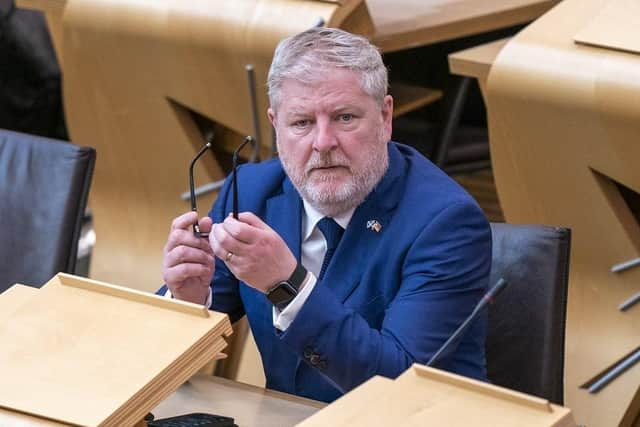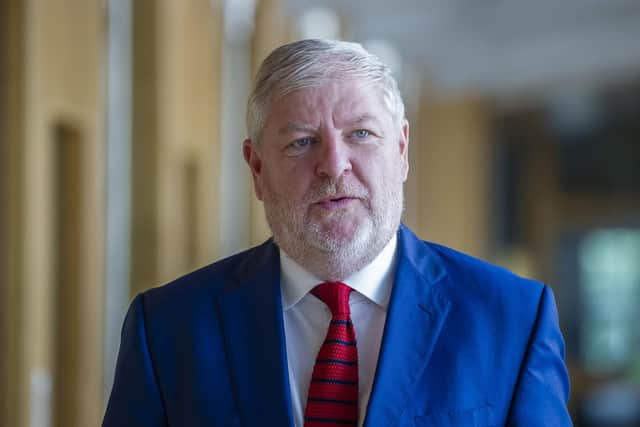Culture secretary admits alternative funding sources needed to secure future of arts in Scotland
Culture secretary Angus Robertson has admitted alternative sources of funding need to be found to secure the future of Scotland’s arts industry and realise the ambitions of its leading festivals, events and venues.
Overseas philanthropists, stadium and tourist taxes, as well as a “percentage for the arts” scheme that would see culture secure a share of spending on new public buildings, will be explored as part of efforts to revive the troubled sector.
Advertisement
Hide AdAdvertisement
Hide AdHe admitted the existing level of support for the arts was not enough to “rectify” the impact of prolonged standstill funding.


Speaking at Holyrood’s culture committee on Thursday, Mr Robertson said the government was open to new ideas on “how we can fund the sector”. But he insisted there was no “silver bullet” solution to ensure the industry thrives in future.
Mr Robertson said the initial phase of a five-year programme to increase arts funding by £100 million would focus on how to “sustain” the cultural landscape, including helping organisations, venues and festivals back who find themselves on a financial “cliff edge”.
He revealed the Scottish Government would be seeking talks with local authorities to stress the importance of keeping arts funding intact.
Speaking at Holyrood's culture committee, he said: “We have an intention of allowing all of Scotland’s citizens the equal right to access culture and the wellbeing benefits that it brings. As part of securing the future of the sector, we will explore new funding streams in addition to Scottish Government funding.


"I’m keen to progress consideration of the SNP’s manifesto commitment around a percentage for the arts and to draw inspiration from international best practice, such as Denmark’s foundation model. I’m aware of the campaign by the Music Venues Trust regarding using a stadium tax to support grassroots venues.
“I’m keen that we develop further links with key philanthropists within Scotland and globally. I want government networks internationally to support the export of Scottish culture and the sector’s resilience. Our international culture strategy will support this ambition."
Advertisement
Hide AdAdvertisement
Hide AdThe Government has been under fire over research suggesting Scotland has slumped to 28th out of 34 countries in Europe when it comes to arts funding.
He told MSPs: “It is right that we look at all potential options for supporting the arts sector that we can. We have to acknowledge that, in some respects, other countries are ahead of us. The visitor levy is a good example of that.
"I’ve thought for quite a while that, in addition to what the government and what local authorities do, and additional funding streams, that we also have an opportunity to work much more closely with people who, through their generosity or the generosity of trusts and foundations they may be involved. I think we can work much better together with the philanthropic sector, both domestically and internationally.
“I look forward to exploring all of these things. None of them provide the single answer to the concerns we know about very well, but they can all potentially play a part to help the sector be as well funded as it should be.”
Mr Robertson said it was important to highlight the Government was only part of the “public sector funding picture.”
He added: "Many organisations receive money from local authorities. We will work with [council umbrella body] Cosla to ensure that all local authorities understand the important role that culture makes.
“We are at a key turning point in terms of funding for the arts in Scotland. Other administrations in the UK are reducing their culture budgets. We are restoring ours.
Advertisement
Hide AdAdvertisement
Hide Ad“I have great ambitions for how the sector should grow and thrive. I want to have more opportunities for people across Scotland to experience the empowering potential of culture.”
There is mounting concern in the arts industry over the prospect of widespread job losses, reduced programming and insolvencies unless more funding is secured in the short term. Most organisations do not have any confirmed support after March of next year.
Mr Robertson did not say what funding would be available to Creative Scotland for a new long-term funding programme, which is facing a projected gap of more than £50m ahead of key decisions being made this year, but insisted he “fully supported” the scheme’s launch.
He said he hoped the Government’s pledge to increase arts funding by £25m for the sector in 2025/26 would provide “some certainty”, adding he would continuing to “argue the case” for multi-year funding for the arts.
Mr Robertson was speaking the week after Creative Scotland chief executive Iain Munro and arts industry leaders warned of the need for the Government to move “further and faster” to head off the risk of widespread “collapse”.
The Government has restored a 10 per cent budget cut imposed in September and also effectively replaced a further £6m after Creative Scotland was ordered to raid some of its financial reserves during the current financial year.
He said: “I have read and listened to the evidence with great interest. It is clear that, while the Scottish Budget and the announcement of an increase in culture funding by £100m annually by 2028/29 are welcome, there remains a need for long-term clarity and confidence.
Advertisement
Hide AdAdvertisement
Hide Ad"I recognise that the additional £15.8m next year will not rectify years of standstill funding. It’s only the starting point of a journey of three phases – sustain, develop and innovate. It will be followed by a further £25 million next year and the culture budget will increase cumulatively until it is £100m per annum higher by 2028/29.
"This additional resource will allow us to move beyond simply sustaining the sector, to develop it in innovative ways to support Scotland’s creator sector, and its contribution to our wellbeing economy and international reputation."
Comments
Want to join the conversation? Please or to comment on this article.
